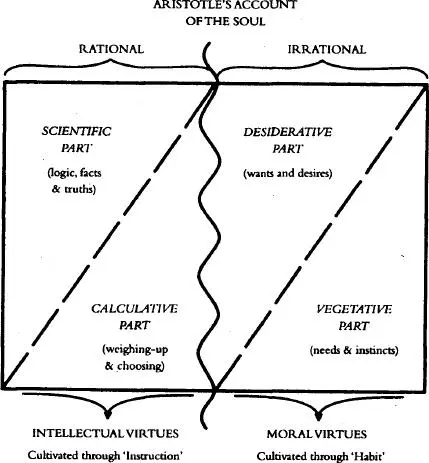the utter servility of the masses comes out in their preference for a bovine existence (p. 68).
Aristotle was nothing if not blunt! His three-part classification leads on to two further points. Firstly, the one thing that distinguishes human beings from the rest of creation is the faculty of reason. We share the basic function of life with both plants and animals, and we share sentience or some form of conscious life along with animals. But only humans have the capacity to use reason in order to think about the quality of their lives. Therefore, if reason is the distinguishing mark of humanity, then happiness, logically, must consist in using that reason in order to work out what a good life is, and then to live it. The second and final point is equally important. For Aristotle, and for the Greeks in general, a person is primarily a member of a group, be it a family, a household, a village or a city state. There is no such thing as a purely free-thinking individual. Our individuality is already partly decided for us by the group or groups of which we are a part. Hence, the overall wellbeing of a group is far more important then the wellbeing of any single member within it.
For even if the good of the community coincides with that of the individual, it is clearly a greater and more perfect thing to achieve and preserve that of a community; for while it is desirable to secure what is good in the case of an individual, to do so in the case of a people or a state is something finer and more sublime (p. 64).
And that, for Aristotle, is the major reason why politicians ought to study ethics, because they have the responsibility of ensuring that the good life is lived by all members of society, and not just by some of them.
The soul
Before any description of a truly ethical person can be given, an account of the soul needs to be offered, for
by human goodness is meant goodness not of the body but of the soul, and happiness also we define as an activity of the soul. (p. 88).

The accompanying diagram is an attempt to simplify Aristotle’s rather wordy account. As can be seen, the soul is divided into two major parts: the rational and the irrational. Whether these are actual divisions in the soul, or whether they are just helpful definitional differences is irrelevant for Aristotle. We cannot split open the person in order to examine the soul like we can a leg or an arm. Each of these two major divisions is also separated into two. The irrational part is divided into the vegetative and the desiderative. The vegetative part is the cause of nutrition and growth; that is, those basic instincts necessary for individual and collective survival, such as earing, drinking, resting and procreating.
The desiderative or appetitive part is associated with those many and varied desires and wants which can be channelled, controlled or made submissive. These are the desires not just for food (that is a need or a vegetative impulse), but for a particular kind of food – cheeseburger with all the relish plus chips and onions. The wants and desires will, of course, include all of those luxury goods and activities which are not strictly necessary for survival. The distinction is clearly between ‘needs’ and ‘wants’; and often what we want is not what we need. I might want another pint of beer after having already drunk three, but, physiologically it is clearly not what I need.
Next, the rational part of the soul is also divided into two: the scientific and the calculative. The scientific part is the bit of the mind which can grasp invariable first principles, that is, knowledge of physics, of mathematics, of geography and so on. It is the section which houses all the facts of the world which are not up for debate or dispute. The calculative part is the bit of the mind which deliberates, considers, weighs up or thinks about things in order to make a decision about what to do, what to choose, what to make, what to buy and so on. Instead of knowing facts, it is concerned with knowing how to choose or how to come to a decision. It allows us to weigh up the pros and cons of an argument or a situation.
The fruit cake example:
It must be stressed at the outset that this is not an example used by Aristotle. However, let us suppose that the vegetative part of me needs sustenance or nutrition and growth. Now, the desiderative part of me desires cake rather than fruit. However, the scientific part of me knows the fact that, given my current waist size, fruit will do me more good than cake will. So, finally, the calculative part of my mind thinks about the advisability of cake over fruit or vice versa, and comes to a decision: How about ‘fruit cake’? The scientific part of my mind will then be able to follow the precise instructions on how to make a reasonably respectable fruit cake of the health-food variety. Thus the vegetative, desiderative, calculative and scientific parts of my ‘soul’ have all come into play.
The virtues:
The reason why Aristotelian ethics is called Virtue Theory is because the virtues, those ‘excellences’ (Greek: arete ) or qualities of mind and character, are at the heart of his argument. There are two sorts of virtues:
moral virtues or qualities of character (such as courage, liberality, temperance, modesty and so on). These virtues are connected to the desiderative and hence, the irrational part of the soul. They can only be cultivated through habit.
intellectual virtues or qualities of mind (such as wisdom, understanding and judgement). These virtues are connected to the rational half of the soul, and are to be cultivated through instruction.
1 Moral virtues
In Aristotle’s account there are twelve moral virtues which fall between two vices: the vice of excess or the vice of deficiency. So, for example, the moral virtue of courage would fall between its excess which is foolhardiness or rashness and its deficiency which is, of course, cowardice.
| Excess |
Virtue |
Deficiency |
| rashness |
courage |
cowardice |
| licentiousness |
temperance |
insensibility |
| prodigality |
liberality |
illiberality |
| vulgarity |
magnificence |
pettiness |
| vanity |
magnanimity |
pusillanimity |
| ambition |
proper ambition |
lack of ambition |
| irascibility |
patience |
lack of spirit |
| boastfulness |
truthfulness |
understatement |
| buffoonery |
wittiness |
boorishness |
| obsequiousness |
friendliness |
cantankerousness |
| shyness |
modesty |
shamelessness |
| envy |
righteous-indignation |
malicious-enjoyment |
|
|
(p.104) |
2 Intellectual virtues
There are nine intellectual virtues comprising five main or primary virtues, and four secondary virtues:
Art or Technical Skill (techne): the practical skill of knowing how to bring something into existence. For example, knowing how to build a house or construct a bridge as well as knowing how to write a poem, paint a picture or sculpt a statue. For the Greeks all things had to meet two criteria: they had to be functional and they had to be aesthetically pleasing or decorative. Plays, poems and statues had a symbolic political, social or religious function as well as possessing what we might call ‘artistic or dramatic beauty’. Similarly, houses and bridges had not only to fulfil their obvious function, but they also had to be pleasing to the eye.
Читать дальше













